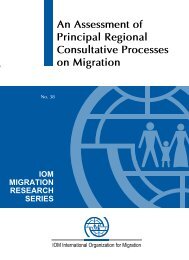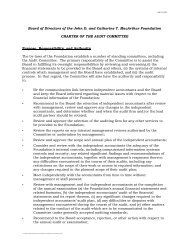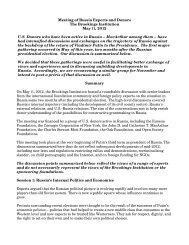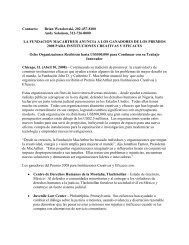A Global Compact on Learning - Brookings Institution
A Global Compact on Learning - Brookings Institution
A Global Compact on Learning - Brookings Institution
You also want an ePaper? Increase the reach of your titles
YUMPU automatically turns print PDFs into web optimized ePapers that Google loves.
57<br />
JBS Internati<strong>on</strong>al, Pathways to <strong>Learning</strong>.<br />
58<br />
E. Unterhalter, Access and Participati<strong>on</strong> of Women and Girls to Educati<strong>on</strong> and Training (New York: United Nati<strong>on</strong>s Divisi<strong>on</strong> for the Advancement of<br />
Women, 2009).<br />
59<br />
Lloyd and Young, New Less<strong>on</strong>s.<br />
60<br />
Glewwe, P., et al. School Resources and Educati<strong>on</strong>al Outcomes in Developing Countries: A Review of Literature from 1990-2010. (Minneapolis:<br />
University of Minnesota, 2011).<br />
61<br />
C. Lloyd, B. Mensch, and W. Clark, “The Effects of Primary School Quality <strong>on</strong> School Dropout am<strong>on</strong>g Kenyan Girls and Boys,” Comparative Educati<strong>on</strong><br />
Review 44, no. 2 (2000): 113–47; M. Grant et al., Gender Differences in School Effects <strong>on</strong> <strong>Learning</strong> and Enrolment Outcomes in Rural Malawi.<br />
New York: Populati<strong>on</strong> Council, 2011.<br />
62<br />
X. Ma, Gender Differences in <strong>Learning</strong> Outcomes: Background Paper Prepared for the Educati<strong>on</strong> for All <str<strong>on</strong>g>Global</str<strong>on</strong>g> M<strong>on</strong>itoring Report 2008 (Paris:<br />
UNESCO, 2007), http://unesdoc.unesco.org/images/0015/001555/155593e.pdf; Lloyd, Mensch, and Clark, “Effects of Primary School Quality”;<br />
Prouty email, February 24, 2011.<br />
63<br />
T. Ford, and T. Boley. Liberia: Up Jumps a Girl into the Book. M<strong>on</strong>rovia: IPS Africa, 2010. http://ipsnews.net/news.asp?idnews=53836.<br />
64<br />
UNESCO, EFA <str<strong>on</strong>g>Global</str<strong>on</strong>g> M<strong>on</strong>itoring Report 2011.<br />
65<br />
UNESCO, EFA <str<strong>on</strong>g>Global</str<strong>on</strong>g> M<strong>on</strong>itoring Report 2010.<br />
66<br />
OECD, Less<strong>on</strong>s from PISA for the United States, Str<strong>on</strong>g Performers and Successful Reformers in Educati<strong>on</strong> (Paris: OECD, 2011), http://dx.doi.<br />
org/10.1787/9789264096660-en; UNESCO, EFA <str<strong>on</strong>g>Global</str<strong>on</strong>g> M<strong>on</strong>itoring Report 2010.<br />
67<br />
OECD, Less<strong>on</strong>s from PISA for the United States.<br />
68<br />
UNESCO, EFA <str<strong>on</strong>g>Global</str<strong>on</strong>g> M<strong>on</strong>itoring Report 2011.<br />
69<br />
M. Mourshed et al., How the World’s Most Improved School Systems Keep Getting Better.<br />
70<br />
M. Lewis and M. Lockheed, Inexcusable Absence: Why 60 Milli<strong>on</strong> Girls Still Aren’t in School and What to Do About it (Washingt<strong>on</strong>: Center for<br />
<str<strong>on</strong>g>Global</str<strong>on</strong>g> Development, 2006).<br />
71<br />
Plan Internati<strong>on</strong>al, Educati<strong>on</strong> Strategy 2010–2013: Children and Young People’s Right to Educati<strong>on</strong> (New York: Plan Internati<strong>on</strong>al, 2010).<br />
72<br />
E. King, “Educati<strong>on</strong> Is Fundamental to Development and Growth,” speech given at Educati<strong>on</strong> World Forum, L<strong>on</strong>d<strong>on</strong>, 2011.<br />
73<br />
T. Nguyen, Informati<strong>on</strong>, Role Models and Perceived Returns to Educati<strong>on</strong>: Experimental Evidence from Madagascar. Bost<strong>on</strong>: MIT, 2008.<br />
74<br />
L. Woessmann, Schooling Resources, Educati<strong>on</strong>al Instituti<strong>on</strong>s, and Student Performance: The Internati<strong>on</strong>al Evidence, Kiel Working Paper 983 (Kiel:<br />
Kiel Institute of World Ec<strong>on</strong>omics, 2000); Lewis and Lockheed, Inexcusable Absence.<br />
75<br />
Annual Status of Educati<strong>on</strong> Report website, retrieved February 22, 2011.<br />
76<br />
Plan Internati<strong>on</strong>al, Learn without Fear: The <str<strong>on</strong>g>Global</str<strong>on</strong>g> Campaign to End Violence in Schools (Bright<strong>on</strong>: Plan Internati<strong>on</strong>al, 2008).<br />
77<br />
Acti<strong>on</strong>Aid, Destined to Fail? How Violence against Women Is Undoing Development (L<strong>on</strong>d<strong>on</strong>: Acti<strong>on</strong>Aid, 2010).<br />
78<br />
Early childhood development encompasses the period of human development from prenatal through first few years of primary school, including<br />
the transiti<strong>on</strong> from either home or an early childhood development program into lower primary (prenatal to age 8). ECD strives to ensure young<br />
children’s overall well-being during the early years, providing the foundati<strong>on</strong> for the development of adults who are healthy, socially and envir<strong>on</strong>mentally<br />
resp<strong>on</strong>sible, intellectually competent and ec<strong>on</strong>omically productive (C<strong>on</strong>sultative Group <strong>on</strong> Early Childhood Care and Development).<br />
79<br />
Aga Khan Foundati<strong>on</strong>, Improving <strong>Learning</strong> Achievement in Early Primary in Low-Income Countries: A Review of the Research (Geneva: Aga Khan<br />
Foundati<strong>on</strong>, 2010); P. Engle, et al. “Strategies to Avoid the Loss of Developmental Potential in More Than 200 Milli<strong>on</strong> Children in the Developing<br />
World.” The Lancet 369 (2007): 229–42; S. Walker et al., “Child Development: Risk Factors for Adverse Outcomes in Developing Countries,” The<br />
Lancet 369 (2007): 145–57.<br />
80<br />
S. Shanker, Self-Regulati<strong>on</strong>: Calm, Alert and <strong>Learning</strong> (Tor<strong>on</strong>to: Educati<strong>on</strong> Canada, 2010).<br />
81<br />
Committee for Ec<strong>on</strong>omic Development, The Ec<strong>on</strong>omic Promise of Investing in High-Quality Preschool: Using Early Educati<strong>on</strong> to Improve Ec<strong>on</strong>omic<br />
Growth and the Fiscal Sustainability of States and the Nati<strong>on</strong> (Washingt<strong>on</strong>: Committee for Ec<strong>on</strong>omic Development, 2006).<br />
82<br />
A. Jamarilo and A. Mingat, “Can Early Childhood Programs Be Financially Sustainable in Africa?” in Africa’s Future, Africa’s Challenge: Early<br />
Childhood Care and Development in Sub-Saharan Africa (Washingt<strong>on</strong>: World Bank, 2008); Committee for Ec<strong>on</strong>omic Development, Ec<strong>on</strong>omic<br />
Promise.<br />
83<br />
See www.ecersuk.org; Bewtra communicati<strong>on</strong>, April 22, 2011.<br />
84<br />
UNESCO, EFA <str<strong>on</strong>g>Global</str<strong>on</strong>g> M<strong>on</strong>itoring Report 2010.<br />
85<br />
J. Heckman and D. Masterov, The Productivity Argument for Investing in Young Children (Minneapolis: Early Childhood Research Collaborative,<br />
2006); J. Heckman et al., “The Effects of Cognitive and N<strong>on</strong>cognitive Abilities <strong>on</strong> Labor Market Outcomes and Social Behavior,” Journal of Labor<br />
Ec<strong>on</strong>omics 24 July (2006): 411–82; R. Grunewald and A. Rolnick, A Proposal for Achieving High Returns <strong>on</strong> Early Childhood Development (Minneapolis:<br />
Federal Reserve Bank of Minneapolis, 2006); A. Verdisco, “Solving Latin America’s Most Urgent Problems: ECD and the C<strong>on</strong>sulta de San<br />
José,” in Coordinators’ Notebook, Funding the Future: Strategies for Early Childhood Investment, Costing and Financing, vol. 30 (Tor<strong>on</strong>to: C<strong>on</strong>sultative<br />
Group <strong>on</strong> Early Childhood Care and Development, 2008).<br />
86<br />
R. Moran, ed., Escaping the Poverty Trap: Investing in Children in Latin America (Washingt<strong>on</strong>: Inter-American Development Bank, 2004); Rania<br />
Ant<strong>on</strong>opoulos, ECOSOC AMR E-Discussi<strong>on</strong> <strong>on</strong> Educati<strong>on</strong>, February 15, 2011.<br />
A <str<strong>on</strong>g>Global</str<strong>on</strong>g> Compa c t <strong>on</strong> <strong>Learning</strong>: Taking Acti<strong>on</strong> <strong>on</strong> Educat i o n in Developing Countries<br />
C e n t e r for Universal Educat i o n at <strong>Brookings</strong><br />
57






